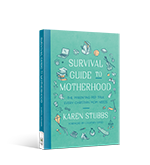
Sign Up for Updates
Connect
TOPICS
- Latest Blog
- Fiction
- Inspirational/Devotional
- Men's Christian Living
- Prophecy
- Women's Christian Living
- View All
ARCHIVES
A Key Tool for Navigating the Science and Faith Conversation
Posted on Jun 12, 2018 Topic : Men's Christian Living, Prophecy
Posted by : Melissa Cain Travis

Pop science media, which has become a highly influential voice in our culture, often suggests that the Christian conception of reality has been made obsolete by the findings of modern science. Books, documentaries, and public lectures made by credentialed scientists sometimes subtly (or not so subtly) imply that science indicates that there is no God and that mankind is nothing more than an accidental creature inhabiting an unremarkable bit of rock floating out in the incomprehensible vastness of space.
Consider the critically acclaimed reboot of atheist cosmologist Carl Sagan’s 1980 miniseries, Cosmos: A Personal Voyage. Hosted by Dr. Neil deGrasse Tyson, professor of astrophysics at Princeton University and popular science personality, Cosmos: A Spacetime Odyssey is a visually stunning exhibition of our universe that, quite rightfully, inspires an acute sense of awe and wonder. The very first episode features an audio clip from the opening sequence of the original version—Sagan’s famous statement: “The cosmos is all that is, or ever was, or ever will be.” The idea is that the physical stuff of the world—matter and energy—is all that exists, a paradigm that automatically excludes a transcendent Creator and an immaterial human soul. In this materialist view, there is no mindful plan behind the universe; blind, naturalistic processes alone must be sufficient to explain everything, including human beings. DeGrasse Tyson cheerfully tells us that we are nothing but “little guys living on a speck of dust afloat in a staggering immensity” of space and time—an idea in direct conflict with the Christian teaching about mankind being the intended and loved crown of creation.
The problem is, Cosmos suggests that science alone can provide answers to the more fundamental questions about reality, such as mankind’s place in the universe and whether or not anything exists beyond the material realm (God, for example). In reality, evidence from the natural sciences alone cannot say anything at all about human significance and the existence of God. These are questions that inevitably require philosophical and theological reflection, though scientific data can indeed play a supporting role. Claims such as “Science has ruled out God” or “Science has shown that humans are merely physical creatures” are false; science examines the physical world, and these kinds of questions are actually metaphysical (beyond the physical) in nature.
Not to mention, there are good philosophical arguments for theism and the human soul that are supported by the latest findings of contemporary science. For example, the kalam cosmological argument uses the overwhelming evidence for the universe having an ultimate beginning to argue for a transcendent cause. Also, evidence from research in neuroplasticity can help make a case for the human soul. These are just two examples that I discuss at length in my upcoming book, Science and the Mind of the Maker: What the Conversation Between Faith and Science Reveals About God.
The bottom line is, being able to identify philosophical statements disguised as scientific ones is enormously useful when engaging in dialogue with skeptics or with fellow believers seeking to understand how core Christian doctrines are compatible with the natural sciences. This skill goes a very long way in helping others become open to considering the ways in which nature points beyond itself to the Mind of a Maker.

Read more in Science and the Mind of the Maker by Melissa Cain Travis

